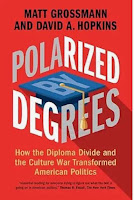THE POLITICS OF GEN Z by Melissa Deckman describes “How the Youngest Voters Will Shape Our Democracy.” Deckman, political scientist and the CEO of the Public Religion Research Institute, looks at voters born between 1997 and 2012 and their growing political participation. She cites interviews and research supporting the increasingly left-leaning activism of women and those concerned with LGBTQ rights; and also notes that young men in this age cohort tend to be more conservative. An entire chapter looks at “gendered spaces” in relation to issues like gun violence, climate change, and income inequality. Almost half of the book is devoted to an Index, Notes section and an extensive Methodological Appendix which includes data, statistics, and numerous graphs. Deckman’s text is an academic one that uses surveys, focus groups, and social science research to argue “the gendered political revolution is underway. Its roots are deep…” For an excellent overview and summary of her arguments, here is an interview with Deckman from PBS NewsHour:
In POLARIZED BY DEGREES, Matt Grossmann and David A. Hopkins have focused on “How the Diploma Divide and the Culture War Transformed American Politics.” Grossmann, Professor of Political Science at Michigan State University, and Hopkins, Associate Professor of Political Science at Boston College, assert that “a growing ‘diploma divide’ has rapidly reversed the traditional relationship between education and partisanship, now separating degree-holding white Democrats from degree-lacking white Republicans.” They note that the combination of trends like increased educational attainment and a leftward shift in American cultural norms “has also left whites without a college degree - who maintain relatively traditionalist predispositions, hold increasingly precarious economic positions, and perceive themselves as vulnerable to downward social mobility - open to populist appeals that promote resentment of, and mobilization against, members of the cultural elite like professional journalists, educators, scientists, and intellectuals.” I have included that excerpt both for content and as an example of the often-verbose style. Numerous scholars and students (see the acknowledgements) provided feedback and input for this text; researchers interested in this topic will find much to explore in the many Notes and detailed Index which together comprise about a third of the text. Recent political discussions do feel as though we do not have shared experiences or speak a common language so I just had to add the blurb for POLARIZED BY DEGREES from The New York Times’ Thomas Edsall: “essential reading for everyone trying to figure out what the hell is going on in American politics.”





No comments:
Post a Comment